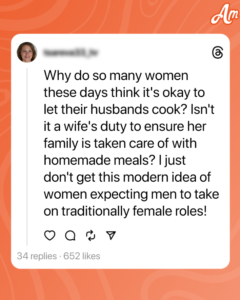Why Many Women Today Think It’s Okay for Their Husbands to Cook
In previous generations, traditional gender roles often dictated that women were responsible for domestic tasks, including cooking, while men were expected to focus on work outside the home. These norms have been changing steadily over the past few decades, influenced by societal progress, the evolving roles of women in the workforce, and shifting perspectives on shared responsibilities in relationships.
Today, more women embrace the idea that their husbands can cook, reflecting broader shifts in attitudes toward gender equality and partnership in marriage. This transformation is rooted in several factors.
1. Changing Gender Roles
As women have gained greater access to education, careers, and leadership positions, traditional gender roles have been reevaluated. The expectation that women should be solely responsible for housework and cooking has been increasingly questioned. Couples now realize that both partners can contribute to domestic duties, including preparing meals. Many modern women are also working full-time, and the dual-income household has become the norm in many societies, making it impractical for one person to handle all household responsibilities. In such settings, dividing tasks, including cooking, fosters a more equitable partnership.
2. Evolution of Family Dynamics
In many contemporary marriages, couples see themselves as equal partners in both family and household management. Women today tend to prioritize teamwork, communication, and shared responsibility, rather than adhering to outdated expectations about gender-specific tasks. The idea that cooking is only a woman’s job no longer holds as much weight in modern society. Couples who share the duties of raising children, managing finances, and running a household are often more successful and content in their marriages.
Additionally, as families evolve, so do their expectations and relationships. Many women appreciate when their husbands cook because it promotes a sense of collaboration and reduces the pressure on women to “do it all.” The idea of shared responsibility is crucial in achieving balance in a partnership.
3. Men’s Evolving Role in the Home
With the changing landscape of gender roles, men are increasingly taking on household chores that were once deemed women’s work, including cooking. More men today enjoy cooking, whether as a hobby or out of necessity. Many find it fulfilling and therapeutic, leading to the rise of male chefs in both professional kitchens and at home. This evolution reflects broader cultural changes, where men feel more comfortable embracing roles that were traditionally reserved for women.
Moreover, cooking is often seen as a creative and enjoyable task. Many men find joy in experimenting with recipes or sharing meals with their families. This shift is empowering for both men and women because it breaks down gender stereotypes and allows individuals to express their unique skills and interests.
4. Mutual Respect and Support in Modern Relationships
At its core, the idea that it’s okay for a husband to cook reflects a deeper respect and understanding between partners. In modern marriages, both individuals often recognize that the strength of a relationship lies in mutual support, not in rigidly defined roles. By cooking, a husband shows care, consideration, and involvement in the family dynamic, creating a more harmonious and emotionally connected home.
This shift toward shared cooking responsibilities is also influenced by the desire to break free from outdated and limiting gender norms. The focus is now on the love and partnership shared between couples, rather than societal expectations.
Conclusion
In conclusion, the idea that it’s okay for husbands to cook today is part of a broader societal shift toward gender equality and balanced partnerships. Women increasingly appreciate when their husbands take on domestic responsibilities like cooking, as it fosters mutual respect, reduces stress, and strengthens relationships. This change reflects evolving attitudes toward gender roles and the desire for fair and supportive marriages.
